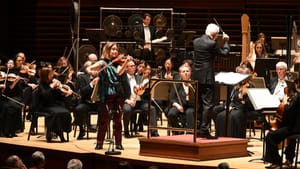Stay in the Loop
BSR publishes on a weekly schedule, with an email newsletter every Wednesday and Thursday morning. There’s no paywall, and subscribing is always free.
Scheherazade’s future
The Philadelphia Orchestra presents John Adams’s ‘Scheherazade.2’

John Adams, arguably the leading American classical music composer of our time, led the Philadelphia Orchestra last weekend in three concerts featuring his magnificent Scheherazade.2, Dramatic Symphony for Violin and Orchestra. This is a relatively recent work, completed in 2015. Adams is renowned as the composer of the opera Nixon in China, and won the Pulitzer Prize for his 2003 work, On the Transmigration of Souls, a commemoration for the victims of the 9/11 terror attacks.
The production featured the full orchestra, peaking at 91 players in top form, sprawled across the stage of Verizon Hall, and a knock-your-socks-off performance by one of the great champions of new music in the classical world today, violinist Leila Josefowicz. Part of the orchestra’s WomenNOW celebration this season, the program included a brief, collegial commentary by Adams.
From oppression to escape
Based on a fresh reading of The Arabian Nights, the work (50 minutes in length) has little in common with the classical war horse by Rimsky-Korsakov, except for some astonishingly tender and transporting melodies played exquisitely by Josefowicz. Adams has called the original story “hideous” and “horrible,” a blood-curdling tale of a woman who must entertain her husband with imaginative stories every night, or be executed at dawn.
Adams has transformed this story of oppression to one of escape, if not complete triumph. Personified by the violin solo and even the soloist herself, the Scheherazade of this four-movement symphony stands up to her oppressors, including a court of religious zealots who prattle and shake their rule books in fury and disdain. Ultimately, she can hope not for vindication, but for only flight and sanctuary. At least this is some form of release, and one that a woman can build a future on.
A strong, stubborn hero
Playing without a score, Josefowicz embodied the strong, perhaps stubborn hero of this updated tale. Her expression and body language fluidly shifted from resistance to determination, from lover (perhaps involved with another woman, Adams suggests) to rebel. The work is saturated with melodic flavor, captured at times confrontationally, other times rapturously, by the singing tone and commanding presence of the soloist’s instrument, a Sam Zygmuntowicz violin she regularly plays in performance.
The movement titles make it easy to understand the interpretation Adams is offering us. Like much complex new music of our age, Scheherazade.2 demands a familiarity with the score, or at least a more detailed descriptive guide than a playbill can contain. Still, the work is approachable for listeners at all levels. Its rich tonality and masterful orchestration are irresistible. The smaller-than-usual Friday afternoon audience was clearly struck by the beauty, power, and contemporary meaning of this work, as was I.
Ravel and Stravinsky
The concert began with Ravel’s Alborada del gracioso, a charming work in what was considered the Spanish style a century ago, complete with castanets and tambourine. Adams also conducted a seldom-played suite by Stravinsky, Song of the Nightingale. In this musical chinoiserie, the Emperor surrenders his beloved nightingale in favor of a mechanical bird, only to find, when he falls ill, that the living creature alone can restore him to health. This work featured truly standout performances by the orchestra’s principal flutist, Jeffrey Khaner (nightingale), and Peter Smith, associate principal oboist (mechanical bird). There was also some wonderful playing of solo passages by Mark Gigliotti, co-principal bassoonist, and Juliette Kang, first associate concertmaster.
What, When, Where
John Adams with the Philadelphia Orchestra. John Adams, Scheherazade.2, Dramatic Symphony for Violin and Orchestra; Ravel, Alborada del gracioso; Stravinsky, Song of the Nightingale. Conducted by John Adams. Leila Josefowicz, violin. September 26 through 28 at the Kimmel Center's Verizon Hall, 300 S. Broad Street, Philadelphia. (215) 893-1999 or philorch.org.
The Kimmel Center is an ADA-compliant venue. Patrons can purchase wheelchair seating or loose chairs online, by calling Patron Services at (215) 893-1999, or by emailing [email protected]. With advance notice, Patron Services can provide options for personal care attendants, American Sign Language, Braille tickets and programs, audio descriptions, and other services.
Sign up for our newsletter
All of the week's new articles, all in one place. Sign up for the free weekly BSR newsletters, and don't miss a conversation.

 Linda Holt
Linda Holt